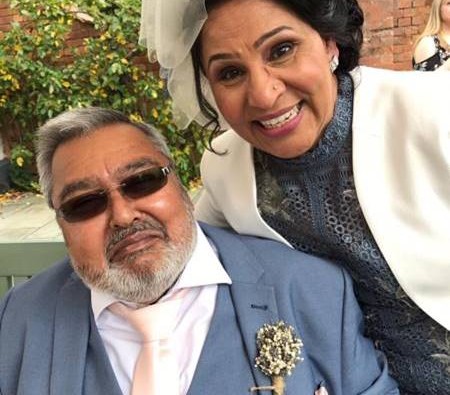Birmingham 14th July 2022: A Birmingham couple are raising awareness of kidney disease and the struggle of gaining a transplant to mark this year’s South Asian Heritage Month. Satnam and Paramjeet Kang – affectionately known as Sam and Pam – are sharing their experience of the disease from the perspective of the Sikh community, highlighting the issues and inequalities that they often face.
Sam was diagnosed with the disease in 2000 after receiving a check-up at a hospital in India while visiting family. “It felt like someone had shot me,” Sam said: “I had some idea that there may be something wrong with my kidneys, but I could not believe that I had gone into kidney failure.”
Sam was told that he would have to start dialysis immediately which was an additional shock to the sudden diagnosis. “I just had to accept the reality of the situation and get on with it. I was initially receiving dialysis three times a week for four and a half hour sessions, but I soon had to be on for four days, meaning I no longer had a whole weekend to rest.”
The process of dialysis can be gruelling, and it left Sam with constant shakes and feeling off balance for a lot of the time. But Sam was not eligible for a transplant straight away due to his underlying health conditions. “I was overweight, had diabetes and high blood pressure.” Sam continued, “The years went by, and I started to lose the weight and got down to the 100kg mark the doctors had given me. I thought that this meant that I was well on my way to receiving a transplant, but there was one final obstacle in the way.”
As a person with South Asian heritage, Sam was told that his ethnicity meant that he would have to wait longer for transplant. Pam sadly wasn’t a match. It would be twelve years before he finally received a new kidney when his wife Pam donated her organ through the kidney share scheme which allowed her to donate to a stranger while Sam received another kidney in return.
People from minority ethnic groups will often wait longer for a transplant than Caucasian patients – usually a year longer – as it is harder to find a match. In 2020/21, donors from black and minority ethnic groups made up just 9.2% of total donations that year and with ethnicity a factor on whether a donated kidney will be compatible with the patient, there are simply not enough organs available for everyone waiting.
Low donation rates are partly due to the fact that kidney disease and donation of organs in general are very taboo topics in some communities, something the family experienced.
Sam’s wife Pam remembers the process: “When we received Sam’s diagnosis it was a big shock and something we were unable to talk about because when you come from a Sikh community, there is a lot of shame and embarrassment around illness, and you always think that you might be judged. People often assume that kidney disease is caused by heavy drinking, which is not the case at all, but the assumption from a close community would be to say that a person with kidney disease does not look after their body. The disease remains taboo which is why we have devoted a lot of our time to speaking to the community and dispelling myths about this horrible disease. I am so glad that I was able to donate my kidney to save Sam’s life and I want more people to feel comfortable to donate and keep their loved ones alive.”
Dr Adnan Sharif, Kidney Research UK trustee and Sam’s consultant nephrologist at the Queen Elizabeth Hospital Birmingham said: “Sam’s experience with kidney disease has been painful and tremendously challenging and unfortunately not uncommon for someone of his ethnicity. Ethnicity is a huge factor in whether a donated kidney will be able to match effectively so when we look for a matching donor kidney for people from minority groups, we are looking at a much smaller pool than most patients. The work that both Sam and Pam do to encourage donations across the community and dispel myths about the disease is invaluable and will ultimately save lives. If we can remove the stigma behind organ donation and encourage more people to come forward, we can have a significant impact on the lives of all patients.”
Pam and Sam are currently volunteering as peer educators with the charity Kidney Research UK in an innovative programme to help shine a light on kidney disease across minority communities. The duo visit Gurdwaras across the West Midlands to spread a positive message about the disease and encourage congregations to sign up for organ donation and dispel the taboo of living with kidney disease.
Sam and Pam have taken on the task of encouraging minority communities to sign up for organ donation
To find out more about Kidney Research UK’s peer educator programme contact Neerja Jain, health equalities programme lead, at – NeerjaJain@kidneyresearchuk.
















